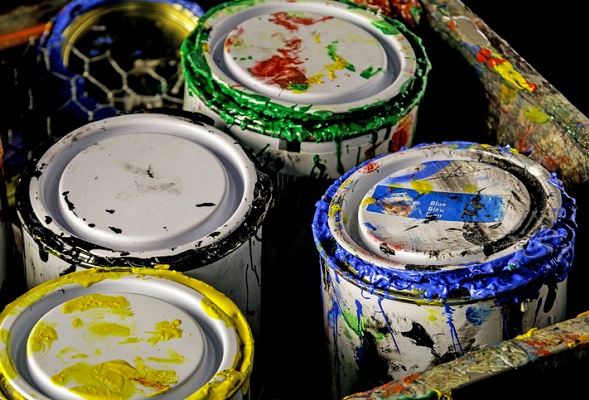How to Dispose of Old Paint
Reading time: 5 minutes
Over time, paint that’s been stored will become unusable. This does depend on varying conditions, from being left in sunlight or warm areas to lids not completely sealed. Bacteria can have a negative effect on paint, as it feeds on the paint to create gases, making it smell bad. Paint can also separate, with parts of it becoming solid and separating from the water in the mixture. At this stage, disposal of paint is pretty much essential.
A couple of paint tins left over from redecorating, a refresh of some skirting boards, touching up a few scratches on the wall, and before you know it, you’re storing several paint tins you don’t know what to do with. So, what can be done about it?
Community groups - if you have paint that’s still usable, you may find there are groups in your community that could use it. It’s a great way to make use of paint you don’t need, while supporting others.
Paint recycling - check your nearest UK recycling centre to find out if the best way to get rid of old paint and paint cans.
Can I pour paint down the sink or drain?
The short answer is no. Pouring paint down your sink, or into outside drainage can cause a lot of problems - not only for your home directly but also for the wider environment. This is also true of paint washed off brushes, as well as thinners such as white spirit. If you’re cleaning brushes, try to clean them into a container, such as a tin, to dispose of later, which we’ll come on to.
Even when washed down with water or other paint thinners, paint can still coat the inside of pipes - this can lead to a risk of blockages. Cleaning this out can be time consuming but can be done with paint thinners. However, if PVC pipes are clogged there are some thinners that may eat through the pipes, so please check the paint thinner instruction to make sure.
Environmentally, it’s not a good idea to dispose of paint through drains, especially any drainage that will soak into the ground. Even CFC-free and non-toxic paints that you may use for rooms such as nurseries still contain chemicals that can be harmful to plant and animal life. The best advice is to keep paint stored until ready for disposal.
Can I take old paint to the tip?
It might be possible to take paint cans to the tip, but usually when the tins are fully dried out. You’ll also have to check with your local authority tip if you can take paint cans to them. Cans can usually be recycled, but plastic paint cans aren’t always accepted.
There are other options available too. You can find your nearest hazardous waste disposal service on the government’s website, or find a paint recycling service in your area.
How long does it take for paint to dry in a tin?
Even left unattended in the tin, paint can sometimes take years to dry out completely, which makes it difficult when you want to dispose of paint cans for recycling. If there’s only a small amount of paint left, this can dry out on its own if left in a dry place, and the lid is left off. You can use paint hardener, sand or sawdust to speed up the process.
Find out more about paint, the right kind of paints to buy, along with our home maintenance guides at Trade Corner.
Disclaimer: The information contained on this page is intended as an overall introduction and is not intended as specific advice from a qualified professional. Travis Perkins aims to avoid, but accepts no liability, in the case that any information stated is out of date.





